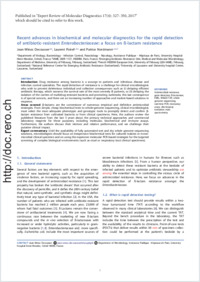Recent advances in biochemical and molecular diagnostics for the rapid detection of antibiotic-resistant Enterobacteriaceae: a focus on ß-lactam resistance
- Decousser, Jean-Winoc Department of Virology, Bacteriology - Infection Control, Parasitology - Mycology, Assistance Publique - Hôpitaux de Paris, University Hospital, Crétail, France - IAME, UMR 1137, INSERM, Paris, France
- Poirel, Laurent Emerging Antibiotic Resistance Unit, Medical and Molecular Microbiology, Department of Medicine, University of Fribourg, Switzerland - French INSERM European Unit, University of Fribourg (LEA-IAME), Fribourg, Switzerland - National Reference Center for Emerging Antibiotic Resistance (Switzerland)
- Nordmann, Patrice Emerging Antibiotic Resistance Unit, Medical and Molecular Microbiology, Department of Medicine, University of Fribourg, Switzerland - French INSERM European Unit, University of Fribourg (LEA-IAME), Fribourg, Switzerland - National Reference Center for Emerging Antibiotic Resistance (Switzerland)
-
03.04.2017
Published in:
- Expert Review of Molecular Diagnostics. - 2017, vol. 17, no. 4, p. 327–350
English
The rapid detection of resistance is a challenge for clinical microbiologists who wish to prevent deleterious individual and collective consequences such as (i) delaying efficient antibiotic therapy, which worsens the survival rate of the most severely ill patients, or (ii) delaying the isolation of the carriers of multidrug-resistant bacteria and promoting outbreaks; this last consequence is of special concern, and there are an increasing number of approaches and market-based solutions in response.Areas covered: From simple, cheap biochemical tests to whole-genome sequencing, clinical microbiologists must select the most adequate phenotypic and genotypic tools to promptly detect and confirm β-lactam resistance from cultivated bacteria or from clinical specimens. Here, the authors review the published literature from the last 5 years about the primary technical approaches and commercial laboratory reagents for these purposes, including molecular, biochemical and immune assays. Furthermore, the authors discuss their intrinsic and relative performance, and we challenge their putative clinical impact.Expert commentary: Until the availability of fully automated wet and dry whole genome sequencing solutions, microbiologists should focus on inexpensive biochemical tests for cultured isolates or monomicrobial clinical specimen and on using the expensive molecular PCR-based strategies for the targeted screening of complex biological environments.
- Faculty
- Faculté des sciences et de médecine
- Department
- Médecine 3ème année
- Language
-
- English
- Classification
- Biological sciences
- License
-
License undefined
- Identifiers
-
- RERO DOC 305215
- DOI 10.1080/14737159.2017.1289087
- Persistent URL
- https://folia.unifr.ch/unifr/documents/305996
Statistics
Document views: 132
File downloads:
- pdf: 301
